#also probably visceral opinions about different accounting standards
Explore tagged Tumblr posts
Text
“Bad Representation” is actually a topic I’m really passionate about and interested in, I could talk about it for ages. The way people handle “Bad Representation” as a concept is genuinely fascinating, too, so this is both an analytical fascination and an anthropological one.
For clarity, I thoroughly do believe there is such thing as “Bad Representation”, especially when it comes to expressions of pure bigotry from the person doing the representing… But I personally think everyone’s bar for what counts as “Bad Representation” is set a little bit too strictly, has no real account for capitalistic and/or historical restrictions - For Example: Language and common understanding of queer identity being far different in the 1950’s than it is now, and Studio Meddling - and also, interestingly, tends to take no account for the opinion of those getting “represented”, or the idea of individual satisfaction.
There’s been many, many times where a character is objectively pretty bad representation by modern standards, but discussion surrounding it takes no account for the concept of Resonance. Sometimes a character is not “Good Representation” as an objective concept, but they are relatable, likable, and quite fun to watch. I’ve seen quite a few instances of people talking down to the mentally ill or disabled for enjoying a Slasher in part because of their disorder/disability, or queer people for enjoying Hays Code villains. Sometimes a character isn’t written kindly, or isn’t written well, but they really resonate with you… And that counts for something.
One of my favorite characters - one who has helped me come to terms with my cPTSD and OSDD - is a representation of PTSD + DID that is objectively not very good. He’s basically a Vietnam War veteran, who gets an Alter in the middle of the war that is basically a self defensive Murder Mode. It’s literally the PTSD from The War and Evil Alter cliche, but there’s just some aspects that really hit for me, like the fact that he’s considered the nicest, kindest person in the cast, and the alter is portrayed clearly as being in constant self defense mode, thinking he’s still in the middle of the war, and also being quite silly. There’s several details I view as being done pretty well, a whole arc about him grappling with his mental health in a way I find quite fascinating and visceral, and I enjoy him quite a lot! But many would agree that he’s “Bad Representation” because of the War PTSD and Evil Alter tropes. Even I agree that those things kinda suck, but that’s not stopping the fact that this character has meant a lot to me, and that I really would not be the same level of okay with myself if I hadn’t discovered this character.
I’ve caught flack for this. I’ve seen many other people latch onto a character who is not executed very well because they find them personally relatable, or are using them to figure some things out about themselves, and also catch flack for it because the character is not “Good Representation” for a group as a whole. No account for Resonance, no account for Individual Experience. It’s a fascinating lack of a sense of nuance.
I think people have forgotten - or perhaps do not realize - that criticizing a base concept, or base execution of a concept, is different from criticizing individual experience. It’s like the difference between criticizing the makeup industry vs. criticizing someone’s personal choice to wear makeup. It is good to point out when something is written or executed poorly, but you do not know the reason why that one individual disabled person enjoys a poorly written character who shares their disability. I would even say that they probably know more than you do that it’s written badly, because they have lived that character’s disability and you likely have not. I think you should maybe step off if a blind person really likes Terezi or something. You do not need to patronize them by telling them that she isn’t “Good Representation” because her quirk isn’t screenreader friendly, and that her blindness has a magical workaround. I think they already know that these are facts about her that are true. They like her for a reason, and that reason is Resonance.
#homestuck#media analysis#disability#representation#bad representation#good representation#nekro.pdf#nekro.txt
98 notes
·
View notes
Text
Today’s dumb James Bond thought is that Vesper was an accountant and a responsible enough one for the Treasury to trust with that much money - so I don’t care how sexy and cool TM she was, babygirl for sure had favourite Excel functions and it’s a crime this is never explored in canon.
#also probably visceral opinions about different accounting standards#where does vesper lynd stand in the vlookup vs index-match debate i ask!#also has her work never came up with james? not even when drunk??#much to think about
125 notes
·
View notes
Text
The Todoroki Family Arc: Dabi and Representation for Abuse Victims
Something I’d like to address regarding all of this Todoroki family discourse is the importance of representation for abuse victims, specifically when it comes to the topic of forgiveness. Many of us who are victims of abuse aren’t willing to forgive our abusers, and there is nothing wrong with taking that stance. The concept of forgiveness of abuse is an especially hard pill to swallow when that forgiveness is for the sake of the abuser and not the victim (i.e., in this case, forgiveness for the sake of Enji’s redemption arc). So this makes the current Todoroki family/Endeavor redemption arc so incredibly difficult to read, as all of the ‘good’ Todorokis are either already willing to forgive (or on their way to forgiving) Enji's long-term, narcissistic abuse.
It’s true that in canon Enji has explicitly stated that he’s not asking for forgiveness and that his family members don’t have to forgive him. Whether or not he truly understands what that means is up for debate (I’ve got a lot to say on Enji’s redemption arc, but that’ll be for another post). But for the sake of this post, let’s state that he genuinely means it, which would be great as it shows an awareness on his part of how unforgivable his actions are. This great and all, except the words lose their weight/significance when every single ‘normal’ family member is on track to forgive him. It would hold much more weight to show he doesn’t get forgiven by everyone, which will require him to at least to some extent, live with the consequences of his actions (e.g., being alone/ostracized from some family members).
So, let’s go through the Todoroki family members who are in the process of forgiving, have already forgiven, or are on their way to forgiving Enji, and how I personally respond to their forgiveness. Of course, all of this will be heavily influenced by my personal opinions and personal experiences, however I think that’s fair – as a person who’s endured long-term childhood abuse from a parent, I’d hope that my opinions (and others like me) will have some weight in the conversation surrounding domestic violence, even within the context of fiction.
Rei:
Rei has shown signs of starting to forgive Endeavor as evidenced by defending him to her children.
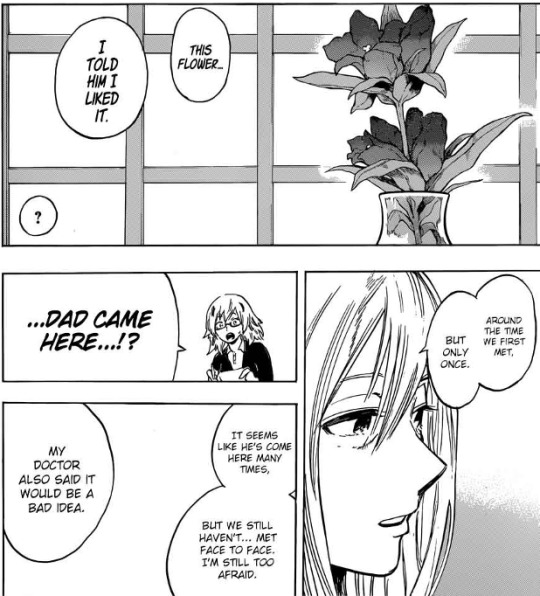
I do appreciate that she states that she’s still too scared to see her husband, and that the doctor states it’s not a good idea. That all makes perfect sense. But the idea that she’s willing to give him a chance to redeem himself because he sends her flowers? I absolutely cannot identify with this in any which way. Her marriage was forced by Endeavor, her sole purpose to bear him cold/hot quirk children. She may have later grown to love him, who knows; we do know she was willing at least have Fuyumi with him, since she suggested it… (although there is a lot to unpack around that too, which I’ll also save for a different post). Even if she did love Enji (and a part of her may still love him, as some of us may feel towards our abusers) she went through YEARS of abuse to the point that she had a psychotic break and had to be institutionalized. To suggest that she’s willing to begin the road of forgiveness because he sends her flowers is just completely unrealistic, and I personally can’t identify with her at all (also, as a sidenote: if my abuser and the cause of my psychosis, who I’m too afraid to see, is sending me gifts, the last thing I would want would be to see those gifts displayed in my room as a constant reminder of them).
Fuyumi:
It’s clear that Fuyumi is well on her way to forgiving her father (if she hasn’t done so already).
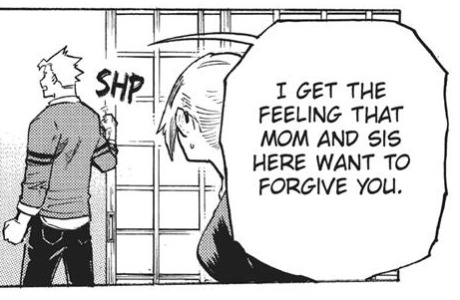
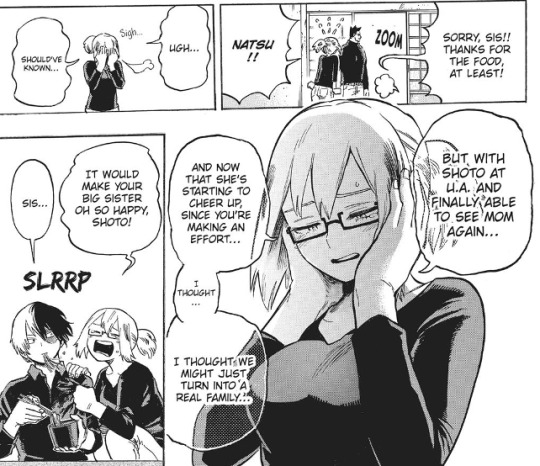
Fuyumi wants nothing more than to piece her family back together, which is entirely fine if that’s what she wants. What bothers me however, is that she’s willing to do so by sweeping the family drama under the rug in an attempt at keeping the illusion of a healthy, loving family (i.e., one that’s not broken by abuse). Why can’t she have this happy family with her brothers and her mother? Why does she feel the need to have Enji in that family picture, considering all he’s done to them? Her whole “it would make your sister happy” is, in my opinion, guilt-tripping and selfish. I don’t think she’s a mean person, and she may not be aware that her behavior could be damaging. But her motivations are clearly self-focused, as she’s not willing to address her family’s issues in a way that validates everyone’s feelings. She just wants everyone to ‘play nice.’
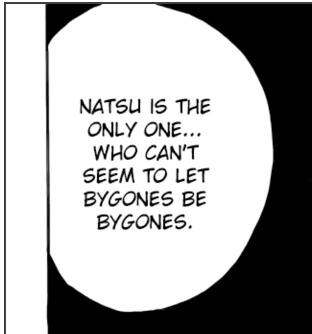
It’s this dismissive behavior, a willingness to overlook the harm of the abuser for the sake of trying to keep a semblance of normalcy when things clearly aren’t normal, that has me label her as an abuse apologist. It’s not intended to be malicious of course; I do think she believes she means well. But how does ignoring the abuse her family endured help anyone? Will this ever get addressed by Horikoshi? TBH, I doubt it, but we’ll just have to wait and see. But one thing is for sure, she’s definitely the most forgiving out of all of her siblings.
Natsuo:
I love this guy. Truly. So far, he’s probably the MOST relatable for me…
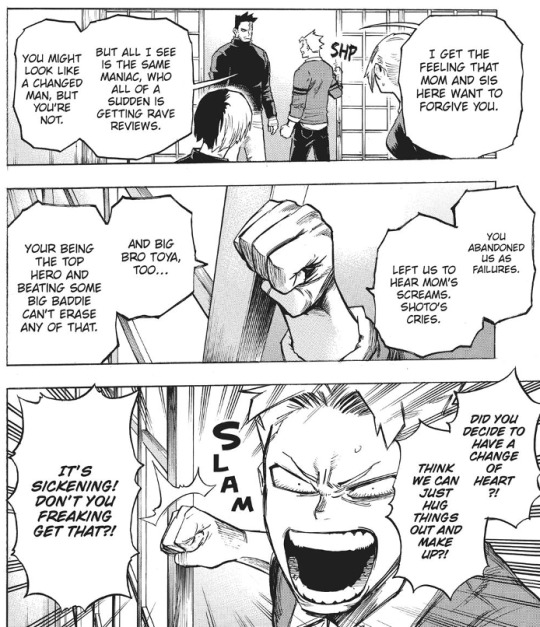
Look at that. Beautiful. I love it. It’s everything I want. He’s unforgiving, holding his long-time abusive father accountable (regardless of how good of a hero he is), while still being a good person (lookin’ at you, Dabi…) all in one breath.
SO… why am I including him in this? Natsuo so far seems to be holding out, but I wouldn’t be surprised if Horikoshi writes him in the direction of forgiveness, especially after this Dabi/Touya reveal. I feel like there’s already been hints at it, and it’s just a matter of time before he inevitably gets written as forgiving his father as well.

Here, you see his mother’s words getting into his head; he’s thinking heavily about what she’s said to him. He doesn’t like the idea of his father looking for redemption, and holds his own disbelief around his father “trying to make sense of it all.” But clearly he values his mother’s opinion on the matter, which will have an impact on his own views/beliefs. Plus, the added pressure of seeing his other family members forgive his father will also have an impact on his stance, either by making him dig his heels in further in resistance, or by accepting their stance on it and as such be one step closer to forgiving Enji himself.


Here, he’s hearing Enji’s words and recalling Midoriya talking to Shouto earlier in the evening. He’s drawing a parallel between what it means to be a kind person and what it means to forgive. It’s followed up by his father’s confession of atonement, which clearly has an impact on Natsuo. His experience here is visceral and entirely relatable; while Enji’s words may sound nice and genuine, it does little to assuage Natsuo of the painful memories he harbors and the damage that his father has caused over the years.
He’s still holding stubbornly onto his anger, unwilling to forgive… but the way it’s playing out, it’ll only be a matter of time. Maybe it’ll be yet another near-death experience for Endeavor, this time by Touya’s hand. Or maybe he’ll feel that deep cut of betrayal from Touya/Dabi that makes him let go of his own anger/darkness in his heart out of a fear of letting it consume him the way it did his older brother. Either way, I see it ending up there. We don’t know for certain yet, of course… but my money is on Natsuo forgiving his father by the end, so I’m holding back on getting too attached.
Shouto:
Shouto also seems to be becoming more open to forgiveness, despite all he’s gone through (and witnessed his mother go through). There’s a lot surrounding why this may be… perhaps it was watching the near-death experience of Enji in the battle with High-End… (which, hey, watching someone you care about nearly die, even if that person is your abuser, would be rough to watch).
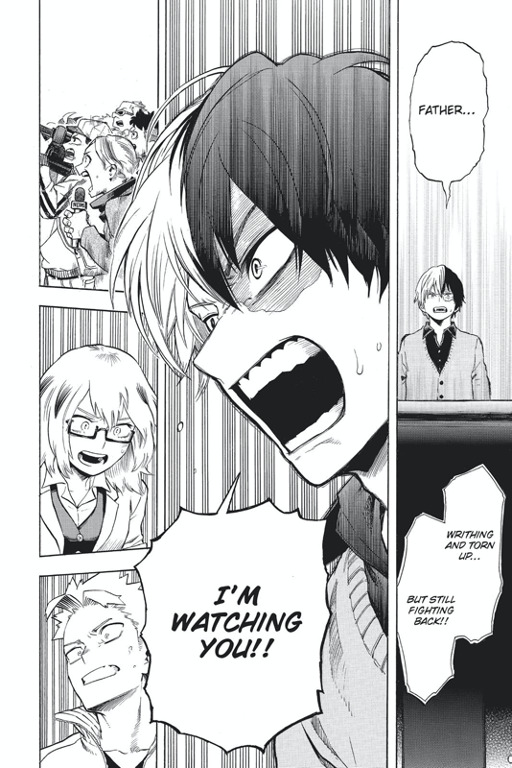

Or watching his father be a badass hero (because let’s face it, Enji is an excellent fighter) that the public looks to for hope. Keep in mind, this happened after Enji had told Shouto he wanted to be worthy of the #1 position and of being Shouto’s father; so Enji has just shown to Shouto that he’s (at least by Hero Society’s standards) worthy of being #1, and now he’s trying to make amends with his family (mm, check out that need for validation…).
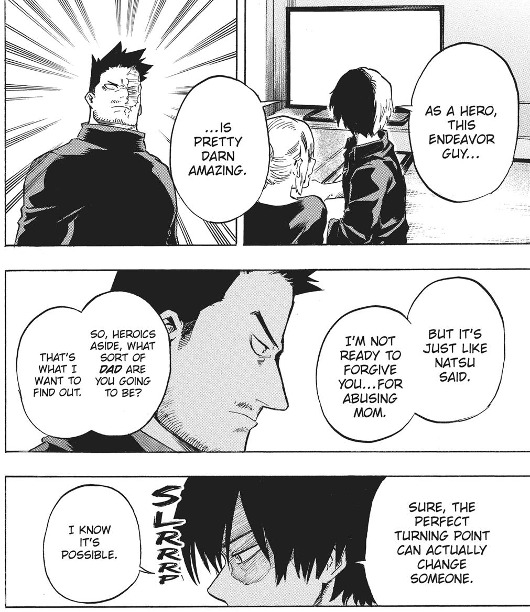
Clearly, Shouto is giving his father a chance to redeem himself.
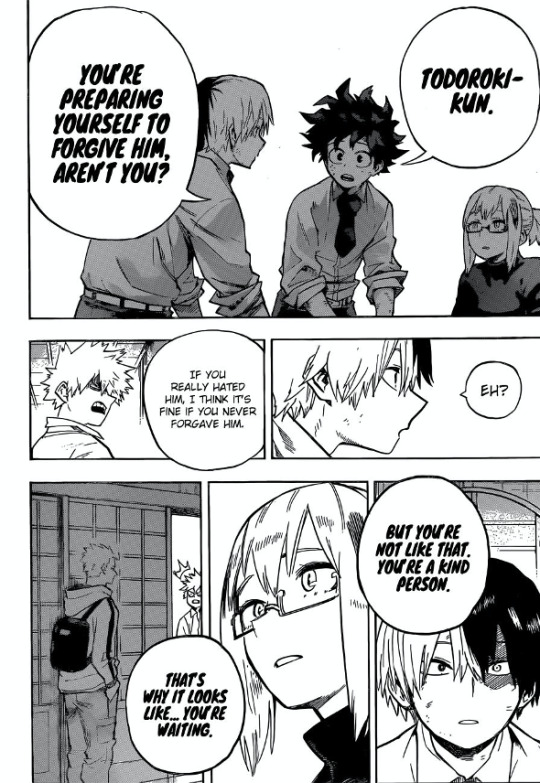
And, of course, we have this page as well, which draws the comparison of being a kind person also being a forgiving person (which, quite frankly, isn’t true - you can definitely be a kind person and still not forgive someone who’s done long-term harm to you). Regardless, it’s clearly being shown that Shouto is obviously heading into forgiveness. Once again, the forgiveness itself isn’t bad… it’s how it’s being portrayed. As someone who’s been abused by someone who’s supposed to take care of them and love them, I can say with certainty that you don’t really care that much about how good that person is at their job. It shouldn’t matter that Enji is a great hero; he’s always been a great hero (that’s why he was second only to All Might). What matters is how Enji is as a father, and it’s well established that he’s failed his entire family, by choice, for years. Shouto states as such to him, saying he’ll watch to see what kind of father he becomes. But this follows immediately after the battle with High-End, which implies that Shouto is basing his willingness to forgive his father off of Enji’s heroics and public acceptance as the symbol of hope. Why this would sway Shouto’s view of his father enough to consider forgiveness for years of physical and psychological damage escapes me.
Now, let’s be clear that forgiveness of an abuser isn’t impossible, but it’s certainly not an easy task. Additionally, the decision to forgive hinges on a lot of things, including whether or not the abuser is worthy of forgiveness (i.e., are the crimes he’s committed against his family redeemable? Is he truly genuinely feeling guilty about what he’s done? Does he understand the magnitude of what he’s done? Is he acting selflessly, or is his quest for redemption rooted in selfishness (e.g., need for acceptance, a way to hold onto one’s power/importance within the family dynamic, etc.)?). In many cases, especially cases where the abuse is long-term as it’s portrayed as being for the Todoroki family, and as mine was growing up, forgiveness isn’t really on the victim’s mind. The damage done by the abuser is so long lasting, leaving a permanent imprint on how we think, act, and behave. It shapes us, especially when it occurs in the formative years of childhood, affecting how we connect with others and how we view ourselves.
So, sharing a few contrite moments with the abuser (in this case, Enji) and seeing some positive situations (e.g., watching him kick ass on TV, be kind to his kids, etc.) do little to persuade me into forgiveness of a man who willingly, repeatedly, chose to abuse his family for at least a decade. His abuse was physical, mental, and emotional. Even if his desire for redemption is genuine, the quickness with which the good characters here begin to forgive him feels slightly forced for the sake of his redemption arc, and is therefore unrelatable. And that is the crux of the issue. Enji’s redemption should be just as much about the healing of his victims as it should be about him (if not more so). However, that doesn’t seem to be the case. So, what we get is a family portrayal that is in favor of the abuser.
So, all of the ‘good’ Todorokis are working toward forgiveness of their abuser. Great. So, where does that leave those of us who aren’t on board with forgiveness? Those of us who see our own abuse, our own history, within this story and are not (and will not) ever forgive our abuser for entirely reasonable and justifiable reasons? Where is our representation in a story that, for all intents and purposes, is meant to be about the ramifications of abuse (and by proxy, victims of abuse)?
Our only remaining choice? Dabi, of course... the psychopath who’s bent on destroying his abuser’s life and the hero society that’s, in some ways, created and supported him.
I think a major reason Dabi is so loved by some of us is that we can identify with that anger, that need for retribution/justice. Are all of us entirely on board with how Dabi has decided to go about this retribution by doing whatever it takes no matter who it hurts or what innocent lives are lost? No, of course not. But in a story where we’re looking for a sense of justice, where the long-term serial abuser DOESN’T get to walk away free with his abused family still by his side/supporting him, what other options do we have? He’s the ONLY ONE who seems to be willing to hold Enji accountable for what he’s done and who sees the hypocrisy in his position as a symbol of hope in contrast to who he has been behind closed doors with his family. So THAT is what we’re defending when we defend Dabi. We’re NOT defending his murders, or him attempting to kill his brother, or ANY of that. We might understand where that darkness is coming from/what’s caused it and empathize with it, but we don’t EXCUSE it.
Now, obviously the story isn’t finished yet, so there’s no way to know for sure where Horikoshi will take this redemption arc. We don’t know if all of the family members really will forgive Endeavor or not, and if Enji will ever be fully welcomed into the family fold. The airing of the Todoroki family’s dirty laundry and its impacts on shining a light on the cracks in hero society give me hope. Also, the diversity across the Todoroki family of how each person copes that that abuse is also well done. That’s why I’m still invested in this story, that’s why I’m still reading it. But we only have what we’ve been shown to go on, and at the moment, there are major aspects of this story that are lacking. The diversity in how each family member handles their abuse and their relationship with their abuser starts to lose its impact when that diversity is gradually washed out in favor of universal forgiveness.
Also, where the manga is currently at gives me concern about the kind of message this story is sending to its readers. I often see others say: “it’s just fiction, relax.” Yes, it is fiction. And when we read fiction, we all search for a piece of ourselves within the story. You can’t have a story that centers around domestic abuse and not have abuse victims gravitate towards it, hoping for accurate representation. And most importantly, even though this is ‘just a story,’ what message is it sending when the only person not willing to excuse/forgive Enji is a psychopath who’s been driven insane by his father’s abuse (and possible by his family’s inability/unwillingness to address said abuse)? What message does it send to abuse victims? What message does it send to those who have never experienced abuse and are learning about it through this fictional representation? To say that this isn’t relevant in a real-world way is inaccurate at best and damaging at worst; and even if it may not hold relevance for some within a real-world setting, for many of us it does and as such the implications and impacts of it should be respected, even if you may not agree with it. In short, for some of us, this is personal.
Now, do I think that every family member should curse Enji into the sun? No, as satisfying as that would be for me. I’d be perfectly happy if some family members forgive and some don’t. Why? Because it’s realistic. It makes sense, because it depends on each character’s unique, personal experiences. Some will forgive, some won’t, and some will continue to defend and provide excuses for said abuser – all of these positions within the abused family dynamic are real and exist. I just wish BNHA would also allow a space for us abuse victims who aren’t willing to forgive – a space that isn’t villainized.
110 notes
·
View notes
Text
Original Post from Amazon Security Author: Becca Crockett
In the weeks leading up to re:Invent, we’ll share conversations we’ve had with people at AWS who will be presenting at the event so you can learn more about them and some of the interesting work that they’re doing.
How long have you been at AWS, and what do you do in your current role?
I’ve been with AWS for nearly four years. I’m a Principal Product Manager in AWS Identity. I spent most of my time covering our Managed Active Directory products, and over the past year I’ve taken on management for AWS Single Sign-On and AWS Identity and Access Management (IAM).
How do you explain your job to non-tech friends?
Identity is what people use when they sign in to their services. What we work on is the back-end systems that authenticate and manage access so that people have secure access to their services.
What are you currently working on that you’re excited about?
Wow, it’s hard to pick just one. So, I’d say I’m most excited about the work that we’re doing so that customers can use identities that they already have across all of AWS.
What’s the most challenging part of your job?
Making sure that we deliver the most important features that customers want, in the right sequence, as quickly as possible. To do that, we need to focus on the key pain points customers have right now and resolve those pain points in ways that are the most meaningful to them. We also need to make sure that we have the right roadmap and keep doing that on an iterative basis.
What’s your favorite part of your job?
I get to work with some really incredibly smart people inside and outside of Amazon. It’s a really interesting space to be in. There’s a lot happening at the industry level, and we’re trying to sort out the puzzle of how we bring things together given what customers have and use today. Customers have all of this existing technology that they want to use, and they have a lot of investments in it. We want to make it possible for them to use those investments in new innovative ways that make their lives easier.
The AWS Identity team is growing rapidly. What are some of the biggest challenges that teams face during rapid growth?
One key challenge is hiring. How do we find great people? Amazon has some pretty high bars, and we need to find the right people that can ramp up quickly to help us solve the challenges that we want to go fix. The other thing is making sure that we stay on the same page. There’s a lot of work that we’re doing across a lot of different areas. So it’s important to stay in coordination so that we deliver the most important things that solve our customers’ current pain points.
What advice would you give to people coming on board the AWS Identity team?
Make sure that you’re highly customer focused. Dive deep because we really need to understand the details of what’s going on and what customers are trying to accomplish. Be a really effective communicator by breaking things down into the simplest terms. I find that often, people get so caught up in technology that they get lost in the technology. It’s really important to remember that we’re solving problems that are very visceral to human beings. In order to get the correct results, you need to be able to communicate in a way that makes sense to anybody.
Which Amazon leadership principles have you relied on the most in your own career at AWS?
Certainly Customer Obsession. That’s absolutely imperative. Dive Deep of course. Learn and Be Curious is huge. But also a less popular principle: Have Backbone; Disagree and Commit. It’s important that we have healthy discussions. This principle isn’t about being confrontational. It’s about being smart about how you synthesize the information that you learn from your customers and bring forth your ideas and opinions in a respectful way. It’s important to have a healthy conversational debate about what’s right for customers, so that we can drive important things forward when they need to be done. At the same time, we must recognize that not all ideas or their timing are right. It’s important to understand the bigger picture of what’s going on, understand that a different approach might be better in that particular moment, and commit to moving forward as a team after the debate is finished.
What’s the most common misperception you encounter about AWS Identity?
I think there’s a huge amount of confusion in the Active Directory area about what you can and can’t do, and how it relates to what customers are doing with Azure AD. We probably have the best managed active directory in the cloud. But, people sometimes confuse Active Directory with Azure AD, which are completely different technologies. So, we try to help customers understand how our product works relative to Azure AD. They are complementary; they can work together.
Another area that’s confusing for customers is choosing which AWS identity system to use today. AWS identity systems have grown organically over time. We’ve listened to customers and added features, and so now we have a couple of different ways of approaching identity. We started out with IAM users and groups. Then over the past few years, we’ve made it possible to use Active Directory identities in AWS. We’ve also been embracing the use of standards-based federation. Federation enables customers who use identity systems like Okta, Ping, Google, or Azure AD, to use those identities to sign into AWS. Due to this organic change, customers can choose between managing identities as IAM, create them in AWS SSO, bring them in from Active Directory by using AWS SSO, or use SAML federation through IAM. We also have the Cognito product that people have been adapting to use with IAM federation. Based on the state of where the technologies are now, it can be confusing for customers to know which identity system is the right one to use right now so they are on the right path going into the future. This is an area we are working hard to simplify and clarify for our customers.
What do you think is the biggest challenge facing the identity space right now?
I think it’s helping customers understand how to use the identity system that they have now—broadly, across all of the applications and services that they want to use—and how to provide them with a consistent experience. I think that’s one of the key industry challenges. We’ve come a long way, but there’s still a lot of road ahead of us to make that all possible at the industry level.
Looking to the future, how do you think the authorization and authentication landscape will evolve?
I think we’ll start to see more convergence on interoperable technologies for authentication. There’s some evolution already happening between the SAML model of authentication and OIDC (OpenID Connect). And I think we’ll start to see more convergence. One sticky spot in the industry right now is how to set up federation. It can be complicated and time consuming to set up, and there’s work that we’re doing in this space to help make it easier. We did a technology demonstration at identiverse last June using the Fast Federation standards draft to connect IDPs and service providers together. In our demonstration, we showed how Fast Fed makes it possible to connect AWS SSO to Google in a couple of clicks. That enables customers to use the identities they already have and use AWS SSO as their AWS integrated permissions management tool to grant access to resources across all their AWS accounts. I think Fast Fed will really help customers because today it’s so complicated to try and connect identity providers to tens or hundreds of applications.
What does identity mean to you on a personal level?
When I think about identity, it’s about who I am, and there are different contexts for that, such as who I am as a consumer or who I am as an employee. Let’s focus on who I am as an employee: Today I may have different user identities and credentials, each to a different system. I also have to manage my passwords for each of those identities. If I make a mistake and use the wrong sign-in or password, I get blocked, and I might get locked out. These things get in the way of focusing on my job. Another example is that if I change my role within a company, I need access to new resources, and there are old resources that I should no longer be able to access. It’s really a pain today for people to navigate getting my access to resources set up correctly. It can take a month before you have all of the different permissions to access the things you need. So when I look at what I want to do for customers, it’s about “how do I make it really easy for people to get access to the things they need without compromising security?” I want to make it so that people can have one identity to use, and when there’s a change to their identity, the system automatically gives them access to what they need and removes access to what they don’t need. People shouldn’t have to go through all the painful processes of going to websites and talking to managers to get them to change group membership.
Will you be doing anything at re:Invent this year?
I’m involved in a few sessions.
I’ll be talking about our single sign-on product, AWS Single Sign-On. It enables customers to centrally manage access to the AWS Console, accounts, roles, and applications using identities from their Active Directory, or identities they create in AWS SSO. We’ll be talking about some exciting new features that we’ve released in that product area since the last re:Invent.
I’m also involved in a session about how enterprises can use Active Directory in the cloud. Customers have a lot of investment in their Windows environments on premises, and they’re migrating their workloads into the cloud. As they do that, those Windows workloads in the cloud need access to Active Directory. Customers often don’t want to manage the Active Directory infrastructure in the cloud. The operational pain of doing that detracts from what they’re trying to do, which is to get to the cloud and actually convert into server-less technologies where they get better economies of scale and more flexibility. AWS offers a managed Active Directory solution that customers can use with their Windows workloads while eliminating the overhead of operating Active Directory domain controllers in the cloud.
What are you hoping that your audience will do differently as a result of attending?
I would love to see customers realize they can take advantage of the services we offer in new ways, and then go home and deploy them. I would hope that they go back and do a proof of concept—go play with it and understand what it can do, see what kind of value it can bring, and then build out from there. Armed with the right information I think customers can streamline some processes in terms of how to get on to the cloud and take advantage of the cloud faster.
What do you recommend that first-time attendees do at Re:Invent?
There’s so much amazing content that’s there, you won’t be able to get it all. So, get clear about what information you’re after, go through the session list, and get registered for the sessions. Sometimes these fill up fast! If you’re coming with a team, divide and conquer. But also leave some time to learn something new in an area you’re less familiar with. Also, take advantage of the presenters. Ask us questions! We’re here to help customers learn as much as they can. If you see me there, stop me and ask your questions!
If you had to pick any other job, what would you want to do with your life?
I would probably want to be in food safety. I used to not care about food at all. Then, I went to an event where I made a life decision that made me think about my health and made me think about my food. So I started understanding more about food. I began realizing how much happens with our food today that we just don’t know about. There are a lot of things that I really don’t align with. I would love to see more transparency about our food so that we could have the ability to pick and choose what we want to eat based upon our values. If it wasn’t food safety, maybe politics.
Want more AWS Security news? Follow us on Twitter.
The AWS Security team is hiring! Want to find out more? Check out our career page.
Ron Cully
Ron Cully is a Principal Product Manager at AWS where he leads feature and roadmap planning for workforce identity products at AWS. Ron has over 20 years of industry experience in product and program management of networking and directory related products. He is passionate about delivering secure, reliable solutions that help make it easier for customers to migrate directory aware applications and workloads to the cloud.
#gallery-0-5 { margin: auto; } #gallery-0-5 .gallery-item { float: left; margin-top: 10px; text-align: center; width: 33%; } #gallery-0-5 img { border: 2px solid #cfcfcf; } #gallery-0-5 .gallery-caption { margin-left: 0; } /* see gallery_shortcode() in wp-includes/media.php */
Go to Source Author: Becca Crockett AWS Security Profile: Ron Cully, Principal Product Manager, AWS Identity Original Post from Amazon Security Author: Becca Crockett In the weeks leading up to re:Invent, we’ll share conversations we’ve had with people at AWS who will be presenting at the event so you can learn more about them and some of the interesting work that they’re doing.
0 notes